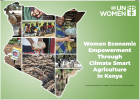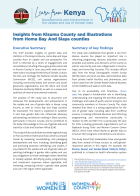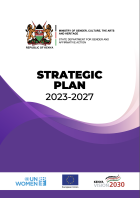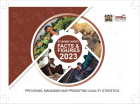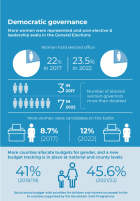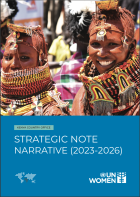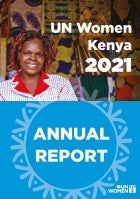1 - 13 of 13 Results
Date:
The UN Women Kenya Annual Report highlights key achievements in advancing women’s empowerment and gender equality.
This report showcases progress in increasing women’s leadership and political participation, strengthening economic empowerment, eliminating violence against women and girls, engaging women in peace and security efforts, and enhancing planning and coordination.
UN Women Kenya remains dedicated to building a future where women are at the heart of developing resilient and sustainable communities.
Date:
The WEE-CSA Storybook showcases the success stories of over 2,400 women from Kitui, Laikipia, and West Pokot who have transformed their lives through climate-smart agriculture. Funded by KOICA and implemented by UN Women Kenya, it highlights the project's impact on livelihoods and gender equality while sharing valuable lessons learned. This collection celebrates resilience and aims to inspire further community upliftment for sustainable development in Kenya.
Date:
Kenya has demonstrated thought leadership in the use of administrative and citizen data for statistical purposes and harnessing official data to meet national priorities and SDG targets including on gender equality and women’s empowerment. This product highlights tangible achievements and lessons in improving access to and use of this data to influence policy and decision-making and improve the lives of women and girls in Kenya.
Date:
The Publication is a detailed strategic plan for the period 2023-2-27. It highlights previous achievements, lessons and emerging issues that define the policy direction of the gender sector achieving a society free from gender discrimination and violence
Date:
The objective of the present study is to present an overview of the adjusted gender pay gap and labour-market inequalities in Kenya. This is part of a larger 2023 UN Women study titled “Why Women Earn Less: Gender Pay Gap and Labour-Market Inequalities in East and Southern Africa.”
Date:
The disproportionate burden of unpaid care and domestic work on women can significantly limit their ability to engage in productive activities or participate in public life and even contribute to the feminization of poverty. The new data is important for accurately measuring the household production of goods and services and their contribution to the national economy.
Date:
This brief summary contains key facts and figures of the Economic Survey. It provides basic statistics of financial disbursement of the Kenya Government to women and men, as well as the extent to which women and men have access to equal opportunities for employment in Government in a number of key sectors.
Date:
Our priority areas:
• Governance and participation in public life
• Women’s economic empowerment
• Ending violence against women and girls
• Women, peace and security, humanitarian action, and disaster risk reduction.
Date:
UN Women Kenya will focus on integrated approaches with seven systemic outcomes to address the root causes of inequality and affect broader systems change, across its thematic focus areas:
• Governance and participation in public life
• Women’s economic empowerment
• Ending violence against women and girls; and
• Women, peace and security, humanitarian action, and disaster risk reduction
Date:
UN Women Kenya Annual report shares results and lessons learned for 2021.
Date:
COVID-19 is arguably one of the biggest pandemics to hit the world in recent times. Globally, it has affected the achievement of the Sustainable Development Goals (SDGs) as governments across the world have focused on implementing containment measures.
Date:
This report explores some key indicators of women’s economic empowerment in labour markets and women’s political participation and economic leadership in the Indian Ocean Rim region through three dimensions: resources, agency, and achievements. It highlights good practices, case studies, and challenges and opportunities for investments and initiatives, and provides key recommendations for Indian Ocean Rim Association (IORA) Member States and other stakeholders to realize women’s economic empowerment in the region.
Date:
This is a convening report for the Regional Sharefair on Gender and Resilience in Africa held by UN Women in collaboration with key partners in November 9th –10th 2016 at Safari Park Hotel, Nairobi, Kenya. Focusing on the main theme of “Strengthening Resilience by Empowering Women”, the Sharefair provided a platform for sharing and learning, availed an opportunity to further explore the role of women in building and strengthening resilience and promoted dialogue and sharing of experiences on gender responsive resilience related programmes and policies in Africa. This is expected to accelerate development and humanitarian response and the overall achievement of the Sustainable Development Goals (SDGs). The Sharefair also endeavor to facilitate long term collaboration amongst regional stakeholders with the aim of identifying problems, using data and predictive methods and mobilizing support and resources to incubate, accelerate and scale effective solutions. The outcome of the two-day event was the creation of a strong regional network to amplify resilience solutions, sustaining change in policy and practice within relevant macroeconomic frameworks. Hundreds of participants gathered at the Sharefair to discuss interventions, innovations, good practices, evidence from research and documented data, legal frameworks and policies.


